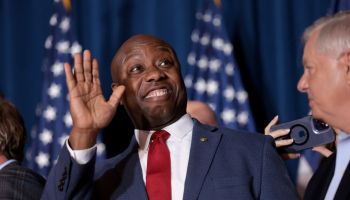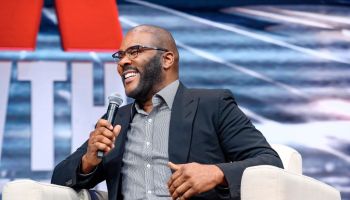WASHINGTON — President Barack Obama alternatively courted and blasted Republicans who have impeded his health care plan Thursday, in an extraordinary live-on-TV summit aimed at breaking a partisan deadlock over his top domestic priority.
With the unprecedented, daylong policy debate available from start to finish to a divided public, Obama and Democratic leaders cast the reform they want as critical to tackling an issue that is even more pressing to many Americans — the struggling economy. Republicans fought back, and tempers flared.
“We just can’t afford this. That’s the ultimate problem,” said Rep. Eric Cantor, the No. 2 House Republican.
RELATED: Obama Unveils His Own Health Care Reform Plan
Passing a version of the bill that Republicans managed to block despite solid Democratic majorities in Congress also is critical to the president’s political future and that of his party ahead of congressional elections in November.
With that in mind, Obama is trying to boost support from moderate Democratic lawmakers, who could face the wrath of conservative voters if they back their president’s plan.
Text continues after gallery …
“We all know that this is urgent,” Obama said.
At stake is the Democrats’ stalemated legislation to extend coverage to more than 30 million people who are now uninsured.
Polls show Americans want their elected leaders to address the problems of high medical costs, eroding access to coverage and uneven quality. But the public is split over the Democrats’ sweeping legislation, with its $1 trillion, 10-year price tag and many complex provisions, including some that wouldn’t take effect for another eight years — after Obama has packed up and left the White House.
For Obama, the summit is his chance to make a compelling closing argument to the American people. If he succeeds, Democrats will push ahead to pass the legislation with a package of revisions he’s proposed. If Obama falters, another Democratic president will have been humbled by health care. He will have to appeal to both sides to at least give him a modest bill smoothing some of the rough edges from the current system.
Obama lamented the partisan bickering that has stalled the health care legislation. “Politics I think ended up trumping practical common sense,” he said. But, he noted, “everybody here understands the desperation that people feel when they’re sick. And I think everybody here is profoundly sympathetic and wants to make sure that we have a system that works for all Americans.”
And yet, even as he pleaded for cooperation he acknowledged agreement may not be possible. “I don’t know that those gaps can be bridged,” Obama said. “If not, at least we will have better clarified for the American people what the debate is all about.”
Both chambers of Congress passed separate bills last year. But before the two versions could be reconciled, Republicans captured the Massachusetts Senate seat in a special election to replace the late Edward M. Kennedy. That cost Democrats the 60-vote supermajority needed to overcome Republican procedural obstacles and pass major legislation.
Public skepticism about the health care plan was seen as contributing to the Republican victory in Massachusetts, an overwhelmingly Democratic state. With the supermajority lost and Democrats getting nervous, the White House had been expected to shift its attention to job creation, an issue more likely to resonate with voters.
RELATED: Why Racial Disparities In Health Care Persist
Disagreements were not always expressed diplomatically on Thursday.
The forum at one point yielded a testy exchange between the president and his former opponent Sen. John McCain, who complained that Obama reneged on a campaign promise to bring change to Washington for encouraging health care dealmaking behind close doors.
“We’re not campaigning any more. The election is over,” Obama snapped, prompting the Republican to retort that he’s “reminded of that every day.”
Republican Sen. Lamar Alexander challenged Obama’s claim that insurance premiums would fall under the Democratic legislation. “You’re wrong,” he said. Responded Obama: “I’m pretty certain I’m not wrong.”
As with much in the complicated health care debate, both sides had a point. The Congressional Budget Office says average premiums for people buying insurance individually would be a little higher under the Senate legislation, as Alexander said. But the policies would cover more medical services, and around half of people could get government subsidies to defray the extra costs.
With such opposing positions well staked out before the meeting and no signs of them changing, the president and his Democratic allies prepared to move on alone.
Despite losing their supermajority, Democrats can still pass major health legislation by using special budget rules that require only a simple majority. They have been reluctant to use that process so far because it would enrage Republicans and likely further worsen the partisan divide.
Another alternative if bipartisan agreement eludes Obama on Thursday is going smaller, with a modest bill that would merely smooth some of the rough edges from the current system.
The White House developed the slimmed-down health care proposal so the president will know what the impact would be if he chooses that route, according to a Democratic official familiar with the discussions.
The slimmer backup plan was first reported by The Wall Street Journal.
The summit was held at Blair House, the elegant presidential guest quarters across the street from the White House. Leaders of both parties spoke, with Obama steering the debate as moderator.
It wasn’t a grand, or even particularly comfortable, setting. About 40 senators, representatives and administration officials were crowded around a large hollow square table in a cramped room, perched for the six-hour marathon on wooden chairs with thin cushions. Coffee breaks had been ruled out, so the only pause in the action would come during lunch.
The C-SPAN cable network carried complete coverage, while news operations from cable networks to public broadcasting were making it the focus of their day.















